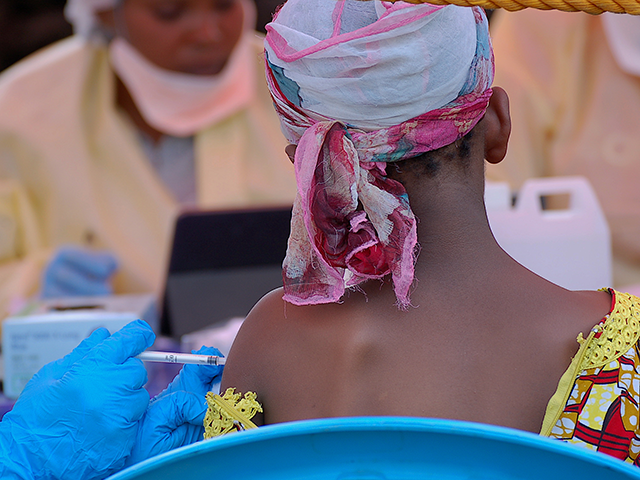Donors to the World Health Organization (W.H.O.) and diplomats from member nations are voicing “serious concerns” about sexual abuse allegations emanating from W.H.O.’s mission to fight the 2018-2019 Ebola epidemic in the Congo, the Associated Press reported Friday.
The AP reported Wednesday that senior W.H.O. officials were lying when they denied knowledge of the Congo allegations, which included local aides complaining they were pressured into sex by at least two W.H.O. doctors.
According to the complaints, one of the doctors made employment with the W.H.O. mission conditional on sexual favors – a difficult demand for impoverished residents of the Congo region to refuse – while another got a local girl pregnant and paid her to keep quiet. The AP obtained a notarized contract that revealed a W.H.O. staffer and manager signed as witnesses to the hush deal to “protect the integrity and reputation” of their organization.
The W.H.O. doctors in question, Boubacar Diallo and Jean-Paul Ngandu, denied any wrongdoing, but the AP conducted an extensive investigation including dozens of interviews, emails, legal documents, and recorded meetings that showed W.H.O. senior management disregarded the complaints about both men. The woman who accused Diallo of demanding sex in exchange for employment said he “often bragged about his connections to W.H.O. Director-General Tedros Adhanom Ghebreyesus.”
“Eight top officials privately acknowledged that WHO had failed to effectively tackle sexual exploitation during the Ebola outbreak and that the problem was systemic, recordings of internal meetings show,” the investigative report stated.
“Over 2018 and 2019, three Ebola experts, including two who worked for W.H.O. at the time, told the AP they raised concerns about sex abuse in general, and Diallo in particular, with senior managers. But they said they were told that controlling the Ebola outbreak was more important, and two said Diallo was considered ‘untouchable’ because of his relationship with Tedros,” the report added.
The AP faulted W.H.O. for running a perfunctory investigation of the abuse claims, failing to observe its own protocols for handling abuse charges, instructing whistleblowers to keep quiet, and failing to interview any of the accusers. Some of the W.H.O. officials who talked with AP reporters seemed well aware the organization has pervasive problems with sexual abuse, and were unsurprised the Congo allegations went nowhere:
“All of us may have been suspecting for as long as the Ebola response was taking (place) that something like this would be possible,” said Andreas Mlitzke, director of WHO’s office of compliance, risk management and ethics, during an internal meeting in November. Mlitzke likened WHO officials in Congo to “an invading force” and said, “Things like this have historically happened in wartime.”
Mlitzke said during the meeting that WHO typically “takes the passive approach” in its investigations, and that it couldn’t be expected to uncover wrongdoing among staffers.
“What prevents us from doing something proactive is our own psychology,” he said.
The AP’s follow-up report on Friday found diplomats and W.H.O. donors in the United States, U.K., and Europe expressing grave concerns about the Congo allegations, notably including the Bill and Melinda Gates Foundation, the third-largest funder for the World Health Organization.
“Our role as a funder is to hold organizations that receive grants from the foundation to the highest standards of transparency and accountability, and to insist that they take steps to prevent misconduct in the future,” the Foundation stated.
Most of these unsettled W.H.O. supporters suggested they want the organization to investigate the sexual abuse charges more seriously, or else they might withhold funding. The World Bank has already paused negotiations for new financing in the Congo, including further money for W.H.O. operations, until the allegations are thoroughly addressed.
“What’s alarming is that WHO seems to be keeping this abuse quiet and not publicly condemning these allegations. There’s a lot of talk about giving WHO more money but I don’t think any government should be committing to that until we know it’s an organization we can trust,” advised London School of Economics assistant professor Clare Wenham.
British ambassador to the United Nations Simon Manley indicated his government is seriously considering just such an approach.
“The U.K. has a zero tolerance approach when it comes to sexual exploitation and harassment – and that extends to all international organizations that we fund. We are speaking with WHO and other major donors as a matter of urgency to establish the facts,” Manley said.
Unfortunately, United Nations agencies are no strangers to sexual abuse scandals. W.H.O. is one of three such agencies accused of abusing women in the Democratic Republic of Congo during the Ebola outbreak, along with the International Organization for Migration (IOM) and UNICEF. All of those organizations have ostensibly been investigating their sex abuse scandals since late last year.

COMMENTS
Please let us know if you're having issues with commenting.